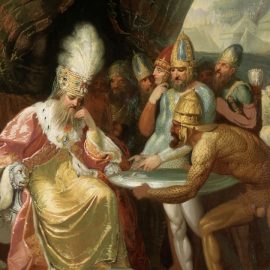

This article is an excerpt from the Shortform book guide to "Caste" by Isabel Wilkerson. Shortform has the world's best summaries and analyses of books you should be reading.
Like this article? Sign up for a free trial here .
What is a caste society? What factors determine members’ positions within a caste?
Caste describes a man-made social hierarchy developed to rank the value of certain groups of people. In a caste society, the factors used to delineate groups are justified as laws of nature, but power is really at the heart of these decisions.
Keep reading to learn more about caste society and how it works.
What Is a Caste Society?
Caste describes a man-made social order developed to rank the value of certain groups of people. This order is based on the assumed supremacy of one group and assumed inferiority of others according to heritage, personal characteristics, religious preferences, or economic status. More often than not, the characteristics used to delineate groups are arbitrary and benign in other contexts. They only become important when one group uses them to segregate people and assign parameters for the appropriate behaviors of each group.
There are three main examples of caste systems in history—Nazi Germany, India, and the American South. Each caste society was upheld through systemic stigmatization of those in the lowest group to legitimize the dominant group’s oppressive behaviors.
Once a caste system is in place, the supporting evidence is enforced until it becomes the inherent beliefs of a culture. When society buys into these beliefs, the laws and principles guiding them are no longer questioned. The dominant group becomes free to treat the lower groups however they see fit to maintain their distinction. This treatment is often cruel so as to debase and diminish the spirit of the lower castes.
Caste vs Class
Some argue that a subordinate caste member can improve their circumstances and rise above their caste, but this idea relates to class, which is different. Class is a socioeconomic distinction. A rich man can lose everything and become lower class overnight. Likewise, a poor man can win the lottery and start moving in high-class society. But in a caste society, his position never changes.
The difference between class and caste is evident in American society. Many members of the subordinate class are able to elevate their status by becoming famous, wealthy, or people of distinction. These factors help them live a better life, but they do not insulate them from the beliefs about and treatment of members of their caste.
A Shift Away From Caste
All human life is a momentary occurrence in the history of the world. Therefore, the actions of one group to force another to spend this fleeting existence in captivity is criminal and immoral. Everyone deserves to become the best versions of themselves, and everyone loses when that right is taken away.
Who knows who the 11 million people the Nazis murdered could have become. What might the legacy of the 750,000 people who died fighting over slavery have been? What contributions could the millions of enslaved people have made to American society and the world? How would humanity and the planet be different today if all those people had lived out their dreams and reached their full potential? A look at one survivor gives us a glimpse of what was lost.
The Genius of Albert Einstein
Albert Einstein is considered one of the greatest minds to have ever lived. He was a true genius, and his contributions to science with his Theory of Relativity revolutionized physics and our understanding of energy, matter, and gravity. But these contributions were almost not realized.
Einstein and his wife, Elsa, were Jewish, and in December 1932, they escaped the Nazis and traveled to America. A month after they left, Hitler became the chancellor of Germany, and the terror of the Third Reich kicked into high gear. Approximately 30 days is all that stood between Einstein’s life and his certain captivity by the Nazis.
When the couple landed in America, Einstein was shocked to find a similar system of hate and oppression in this new country. His superior logic couldn’t make sense of a civilized society’s obsession with prejudice and discrimination. He witnessed many of these behaviors in Princeton, New Jersey, where he taught at the university. He noticed the decrepit communities blacks were forced to live in, the segregated establishments, and the subservient roles they were cast in.
On one occasion, a famous black opera singer performed at the theater in town and received glowing reviews, but the high-end hotel in town wouldn’t permit her to stay. Einstein invited the singer to stay at his home, and she continued to do so whenever she was in town, even after segregation was banned.
To combat the degradation of the black community, Einstein founded a committee to bring an end to lynchings and joined the NCCAP. He joined the Civil Rights Movement and openly supported its leaders. For his efforts, he was invited to deliver the commencement speech at the historically black college Lincoln University in Pennsylvania. In his speech, he spoke of the disease of racism as an affliction of white people, and he would continue to work to cure the burden that disease created for blacks.
Einstein understood the dangers of scapegoating one caste for the ills of society because he was part of the subordinate caste in Germany. We might be tempted to believe he would have been spared because of his genius, but this is wishful thinking. No one from the subordinate caste is spared when their lives are deemed subhuman and unworthy. The world was lucky that this Jewish man escaped his mortal fate at the hands of the dominant caste. But who else did we miss out on who weren’t fortunate enough to survive?
Dismantling Caste Society
If we are waiting for laws and policies to change the caste system in America, we’ll be waiting a long time. As history shows, laws and policies merely change which behaviors are allowed, but they don’t change the social mindset rooted in the original narrative. The only way to dismantle caste in society is for each of us to open our minds and hearts enough to see how we’ve been manipulated into division.
Germany provides an example of how to dismantle a caste system. The government disavowed the ideologies of the Nazis and addressed the needs of the victims, creating awareness and empathy that served all citizens. Similarly, but on a smaller scale, the U.S. Civil Rights movement prompted government action that addressed the needs of the disenfranchised, which benefited all of society. .
Protections against job discrimination, voting rights, and desegregation helped women of all races and ethnicities, and they continue to protect people based on sexual orientation and gender. Dismantling the caste system completely would likely have even greater benefits for society as a whole.
Removing this long-standing ideology from U.S. culture will require honesty and awareness on the part of the dominant caste. It’s easy to vilify an egregious affront to injustice without acknowledging how we perpetuate injustice through our own actions. But these ordinary actions or lack of action are what uphold the caste system.
Turning a blind eye to racist jokes or comments, staying silent when witnessing injustice, or refusing to pay higher taxes for changes that benefit more than just our communities all keep the caste mechanism moving. The toxins of caste exist in all of us, but we all have the capacity to cure ourselves. We must recognize that winning a rigged game is no victory at all. We must learn that uplifting all humans uplifts the standards of human excellence.
The dominant caste must open their eyes to their past and present behaviors because, eventually, every American will become a disfavored member of society. Ageism is a form of discrimination, and we will all grow old and experience what it means to be demeaned and overlooked as a viable member of society.
What we need is radical empathy, which is more than just imagining what it’s like to walk in another’s shoes. Radical empathy is the active choice to educate ourselves about others’ experiences by listening to the personal accounts of those we don’t understand. We must acknowledge that our understanding of another’s life is shallow, and only those living the experience have the right to qualify its effect on their lives. We can imagine what it would be like to have one arm, but we cannot tell someone with one arm how they should feel about their challenges.
The dominant caste enjoys a life of privilege, but that privilege brings the moral responsibility to step in and correct the injustices created by it. We did not create the caste system, but we’re responsible for allowing it to continue. We can’t settle for being tolerant, not racist, or not sexist. We need to switch our focus from one of “anti-hate” to “pro-humanity.” We must challenge the roles we play and examine our beliefs and desires for life. And if those beliefs and desires pertain to justice for all, then our behaviors must align with them.
We all have something to offer the world by way of our talents, intellect, and ability to love. The choice to use those traits for good is entirely ours to make, but ignorance is not an excuse. The false superiority we continue to feel is of our own making, and we have the power to change it. A world without castes is possible if we allow the reality of life to take hold of our national ideology. We are all the same species, and the well-being of everyone is essential for our species to survive and thrive.

———End of Preview———
Like what you just read? Read the rest of the world's best book summary and analysis of Isabel Wilkerson's "Caste" at Shortform .
Here's what you'll find in our full Caste summary :
- How a racial caste system exists in America today
- How caste systems around the world are detrimental to everyone
- How the infrastructure of the racial hierarchy can be traced back hundreds of years






